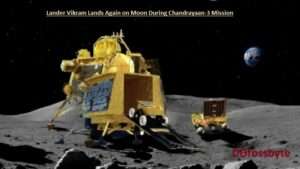In a remarkable feat of precision engineering and determination, the Indian Space Research Organisation (ISRO) has achieved yet another milestone in lunar exploration. The Vikram lander, which was part of the Chandrayaan-2 mission, has successfully soft-landed on the far side of the Moon.

This historic achievement not only marks India’s prowess in space technology but also opens up new possibilities for lunar exploration.
A Second Chance for Vikram
The Vikram lander’s journey to the Moon was initially planned as part of the Chandrayaan-2 mission in 2019. Unfortunately, during its descent, the lander lost communication with mission control and crash-landed on the lunar surface. This setback was a disappointment for ISRO and space enthusiasts worldwide. However, ISRO never gave up on Vikram.
The Surprise Landing
In a surprising turn of events, Vikram has now soft-landed on the Moon’s backside. ISRO released a new video showcasing this incredible achievement. The video captures the final moments of Vikram’s descent, highlighting the precision with which it landed. This unexpected success has left both scientists and space enthusiasts elated.
New Possibilities for Lunar Exploration
The soft landing of Vikram on the Moon’s far side opens up exciting possibilities for lunar exploration. This largely uncharted territory could hold valuable scientific insights and resources. ISRO’s success with Vikram reaffirms India’s commitment to lunar exploration and positions it as a key player in future lunar missions.
The Importance of Persistence
ISRO’s success with Vikram’s second landing attempts demonstrates the importance of persistence in space exploration. Despite the initial setback, ISRO continued to work on the project, fine-tuning the technology and ensuring a successful landing. This achievement serves as an inspiration for scientists and space organizations worldwide.

International Collaboration
The success of Chandrayaan-3 and Vikram’s landing showcases the potential for international collaboration in space exploration. Scientific endeavors like these can benefit from the collective expertise and resources of multiple nations. ISRO’s achievement is a testament to the power of global cooperation in the quest for knowledge.
Looking Ahead
ISRO’s achievement with Vikram’s soft landing on the Moon’s backside is a proud moment for India and the global space community. It paves the way for further lunar exploration and underscores the importance of determination and perseverance in scientific endeavors. As ISRO continues to push the boundaries of space exploration, the world eagerly awaits the discoveries and innovations that lie ahead.

The Chandrayaan-3 mission made its initial landing on the lunar surface with the lander Vikram, marking a historic moment for the nation. Subsequently, several days passed as Vikram, a symbol of ambitious aspirations, completed various tasks on the Moon’s surface. As the lunar evening approached, it was time for Vikram to enter a rest phase after completing its mission objectives. However, ISRO had a surprising update to share.
This achievement highlights the potential for future lunar missions to not only land but also take off from the Moon’s surface, a crucial aspect for future lunar exploration and potentially bringing astronauts safely back to Earth.

Additionally, the rover on Chandrayaan-3 has made a remarkable discovery by detecting the presence of oxygen on the lunar surface. This discovery was made using the Laser Induced Breakdown Spectroscopy (LIBS) instrument on board the rover. The instrument fired a laser beam at the lunar surface and analyzed the reflection, confirming the presence of surface oxygen in the form of ilmenite (FeTiO3). This discovery suggests that there could be an alternative source of oxygen production on the Moon, potentially making it more habitable for future human missions. The lunar surface also contains various other elements, including sulfur, calcium, iron, chromium, titanium, manganese, and aluminum, further enhancing our understanding of Earth’s celestial neighbor.
